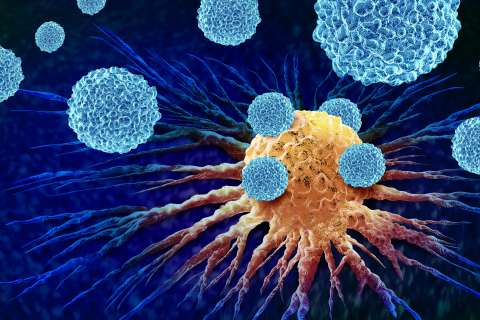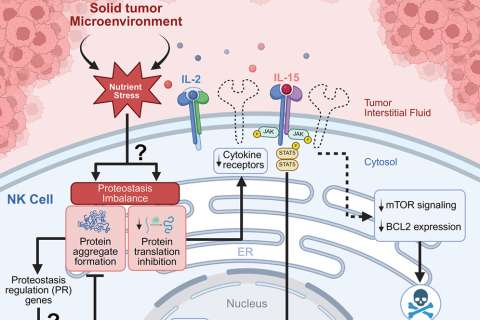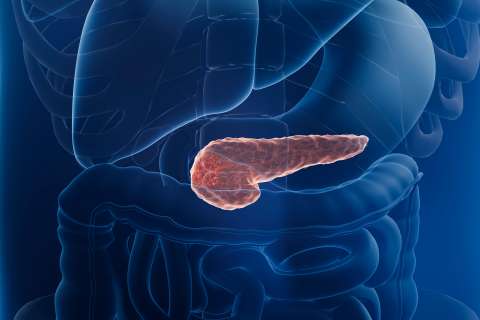Most women have the benefit of easing into menopause over months, even years.
But that’s often not the case for those undergoing treatment for gynecologic cancers. Doctors have terms for it: It’s called “surgical menopause” — often brought on by the sudden removal of the ovaries – or “treatment-induced menopause,” from cancer treatments such as radiation and chemotherapy.
For some patients, it seems like a small tradeoff to beat cancer, but the consequences can be life changing. Hot flashes, mood swings and trouble sleeping instantly become a new way of life.
While many women find relief by going on hormone replacement therapy during menopause, patients diagnosed with gynecologic cancer often face a difficult dilemma: Would taking hormones increase the risk of their cancer returning?
Rachel Frankenthal, a physician assistant at UCLA Health’s Westwood, Westlake Village and Santa Monica OBGYN Specialty Suite, said she noticed that many of her patients going through early menopause rarely would complain about their symptoms unless they were asked.
For those women, Frankenthal wanted to make sure they had options to ease their suffering, using a holistic approach that would help heal their mind and body as they battled cancer. Her efforts are part of a new menopausal symptom clinic at UCLA Health aimed at helping gynecologic cancer survivors live their best possible lives.
‘I’ve found that a lot of women are struggling’
Frankenthal started the program in 2021, teaching a weekly, eight-week, virtual yoga program for a group of gynecologic cancer survivors. The participants immediately enjoyed the connection and camaraderie with other survivors
“One thing I have come to realize is that many women think that it is normal for them to suffer from hot flashes, severe mood changes and insomnia,” Frankenthal said. “I’ve found that a lot of women are struggling and just not talking about it. My goal is to help ease and support their bodies through this massive transition, so that they can embrace and enjoy this next chapter in their lives.”
Surgical menopause can be extremely dramatic in younger women, who go from their body producing ample estrogen to almost none, Frankenthal said.
“I was especially struck by our young patients who are thrust into menopause, some of them in their 20s or 30s,” she said. “The sudden and dramatic shift in hormones is a lot for the body and mind to go through and the side effects can be incredibly disruptive and upsetting for patients. It really is a shock to the system.”
Designing a plan to ease the suffering
It is routine at the UCLA Division of Gynecologic Oncology for the health care team to ask patients about any symptoms of menopause they might be experiencing. The next step is to find the best way to ease the patient’s suffering.
Sometimes hormone replacement therapy is an option, especially for younger patients. Certain antidepressants and other medications can also help with hot flashes.
Aside from being a strong proponent of holistic therapies, Frankenthal likes to recommend herbs and supplements such as lavender, magnesium, melatonin and ashwagandha for anxiety and sleep support; valerian root and black cohosh, when appropriate, for hot flashes; and mood-calming practices including aromatherapy, yoga and mindful meditation.
“We want to treat the whole person,” Frankenthal said. “As oncology providers, we are so focused on treating cancers and saving lives. However, when treating cancer induces menopause, it is also our responsibility to educate patients on what is happening to their bodies and provide appropriate resources and treatments when needed.”

“Shifts in hormones affect so many parts of our bodies,” said Frankenthal, who was a professional dancer and certified yoga and Pilates instructor before she became a PA. “Menopause can affect a person’s sexual, mental and physical health. Because of all the changes our patients go through, menopause can feel very scary and overwhelming. Our goal is to help patients embrace their wisdom and strength as they move through this transition.”
Frankenthal said she noticed how much these menopausal symptoms were hampering women in her program, and that it was not something that oncology departments usually address in depth.
“I was witnessing how menopausal symptoms, sometimes on top of cancer-related side effects, were really starting to affect patients’ lives and relationships. As one of their oncology care providers, I felt it was my responsibility to help, so I started educating myself. I reached out to many women’s health experts at UCLA, joined the North American Menopause Society, attended menopause lectures and continue to research and explore treatments for menopausal symptoms.”
Encouraged by Ritu Salani, MD, UCLA Gynecologic Oncology division director, Frankenthal and colleague Jessica Walchonski, a PA in the department of Obstetrics and Gynecology, started seeing patients for menopausal symptom management visits, separate from other routine follow-up visits. Menopause symptom visits typically last 30 to 45 minutes to allow time to address any symptoms that might be related to menopause.
In addition to other methods, Frankenthal said she likes patients to try acupuncture or acupressure to relax an overactive nervous system.
“The nervous system plays a role in many menopausal symptoms including sleep, mood, sexual function, energy and hot flashes. Finding ways to balance and calm the nervous system has a ripple effect and can improve not only menopausal symptoms, but a patient’s overall health,” she said. “Finding what works for each person can take time and a bit of trial and error, which I always tell patients.”
In addition to exercise and supplements, Frankenthal said she encourages patients to take a look at their diet. For hot flashes, for example, Frankenthal recommends avoiding spicy foods, alcohol and processed, inflammatory foods.
She hopes that society will come to better understand menopause and that women will be more open to discussing it and seeking relief.
“Mothers and grandmothers don’t always share their menopausal experiences and our culture often belittles or jokes about menopause in TV or film,” Frankenthal said.
“Everyone with ovaries is going to go through this eventually,” she said. “Hopefully we can do a better job of seeing this as part of a normal transition in life and learn to celebrate a woman’s maturity, wisdom, power and knowledge.”
Learn more about UCLA Health’s Gynecologic Oncology Survivorship Program.






